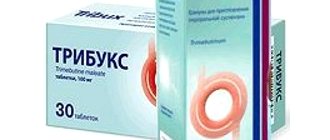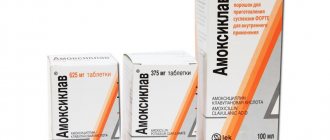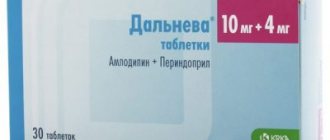Today, drugs that cause aversion to alcohol are widely used in drug treatment practice. As a result of their consumption, a person cannot drink alcohol, since it provokes the development of poisoning, disturbances in the functioning of the stomach, heart, brain and other vital organs.
By combining psychotherapeutic and medicinal effects, good therapeutic results can be achieved. At the same time, it is important that the addict is committed to recovery, listens to the recommendations of his doctor, and has a stable motivation for sobriety.
Compound
One Lidevin tablet contains 300 mcg of nicotinamide or vitamin B3 , 500 mcg of adenine or vitamin B4 , and 500 mg of the active compound disulfiram .
As auxiliary compounds, the drug contains: povidone, magnesium stearate, sodium carboxymethylcellulose, as well as microcrystalline cellulose.
Pharmacodynamics and pharmacokinetics
This combination drug, containing B vitamins , as well as disulfiram is actively used in the treatment of alcohol and drug addiction . Since disulfiram is an inhibitor of the liver enzyme acetaldehyde dehydrogenase , Lidevin can act on it, namely block it in order to increase the production of acetaldehyde , which, in turn, is a metabolite of ethyl alcohol .
Due to the effects of acetaldehyde, the drug causes an unpleasant reaction and negative sensations in patients when drinking alcohol, which can be expressed in the form of sudden flushes of blood to the face, vomiting, tachycardia, decreased blood pressure, and nausea. As a result, a person develops a conditioned reflex aversion to the smell and, especially, the taste of alcoholic beverages.
Already 12 hours after taking Lidevin, the maximum effect of the drug is achieved, which continues for another 14 days after the course of therapeutic treatment. It is worth especially emphasizing that the active compound disulfiram in combination with B quite effectively fights alcoholism .
It is also noteworthy that the pronounced clinical effect of the drug is noticeable even when consuming very small doses of alcoholic beverages. In comparison with similar drugs, Lidevin stands out due to its relatively small number of contraindications and side effects. The drug is used not only during treatment, but also in the prevention of hypovitaminosis , as well as neuropathy due to alcoholism.
Special instructions for the use of the drug Lidevin
Patients should be warned about the risk of developing an alcohol intolerance reaction (see INTERACTIONS). Disulfiram should be taken with caution in patients with hepatic and/or liver failure or hypothyroidism, especially if there is a risk of possible combination with alcohol (see SIDE EFFECTS). With the simultaneous use of the drug and alcohol, depression of consciousness up to the state of coma, cardiovascular collapse, and neurological complications can be observed. Treatment is symptomatic. During pregnancy and breastfeeding. Lidevin is contraindicated during pregnancy and breastfeeding. Children. The drug is not used in children under 18 years of age. The ability to influence the reaction rate when driving a vehicle or working with other mechanisms . The use of the drug negatively affects the reaction rate when driving vehicles or operating machinery, so the drug should not be prescribed to persons whose professional activities require rapid psychomotor reactions.
Contraindications
The drug has the following absolute contraindications:
- hypersensitivity;
- diseases of the organs of vision and hearing , for example, neuritis or glaucoma;
- emphysema;
- tuberculosis;
- diabetes;
- severe forms of cardiovascular diseases ;
- epilepsy;
- bronchial asthma;
- exacerbation of stomach ulcers ;
- polyneuritis;
- pregnancy;
- duodenal ulcer , in the acute stage;
- liver failure;
- oncological diseases;
- thyrotoxicosis.
With extreme caution, the drug is allowed to be used in cases of acute medical need and under the supervision of doctors during remission of a peptic ulcer , after psychosis and circulatory disorders , as well as in old age and in the stage of compensation for diseases of the cardiovascular system.
Side effects
During treatment, Lidevin can cause such adverse reactions as:
- headache;
- hepatitis;
- confusion;
- angina pectoris;
- arrhythmia;
- unpleasant metallic taste in the mouth;
- asthenia;
- allergic reactions;
- neuritis;
- thrombosis;
- cerebral edema;
- collapse;
- convulsions;
- polyneuritis.
Side effects of the drug Lidevin
From the gastrointestinal tract : metallic taste in the mouth, bad breath (halitosis), nausea, vomiting, abdominal pain, diarrhea; unpleasant odor in patients with colostomy (associated with the presence of carbon sulfide). From the liver : an increase in transaminase levels is often observed; rarely - hepatitis, including the fulminant form of hepatitis with a fatal outcome (in patients without chronic alcoholism with allergic contact dermatitis caused by nickel). From the central nervous system : polyneuritis of the lower extremities, optic neuritis, psychoneurological disorders (memory loss, confusion), drowsiness and fatigue at the beginning of treatment, headache; with prolonged use, the development of encephalopathy and epileptic attacks or convulsions, the development of psychoses, exacerbation of polyneuritis, optic neuritis, memory impairment, asthenia, cerebral edema is possible. On the skin : allergic skin rash; when combined with alcohol, intense flushing on the face and erythema may occur. From the cardiovascular system : in some cases - heart rhythm disturbances, angina attacks; in patients with cardiovascular diseases, thrombosis of cerebral vessels may be observed (therefore, if there are complaints of paresthesia in the limbs and face, you should immediately stop using the drug) ; with prolonged use of the drug, the development of cardiovascular failure, myocardial infarction, collapse, arrhythmia is possible; cases of respiratory failure have been described.
Instructions for use of Lidevin (Method and dosage)
In accordance with the instructions for use of Lidevin, tablets are taken strictly 24 hours after the last drink. The recommended dose of the drug is 125-500 mg.
After a maximum of 10 days, medical workers take a disulfiram-alcohol sample from the patient, the results of which determine the effectiveness of therapeutic treatment. To consolidate the results in the future, patients can take 125-200 mg. drug per day for several years.
Interaction
ethyl alcohol , even in small doses Deviations in behavior and loss of coordination may occur when using the drug together with Isoniazid .
Symptoms such as confusion and delirium occur with the combined use of Lidevin and drugs such as Ornidazole, Tinidazole, Metronidazole and Secnidazole. To avoid a toxic effect, it is not advisable to use the drug together with Phenytoin .
Lidevin and Warfarin , because the risk of bleeding increases, Benzodiazepine , due to inhibition of oxidative metabolism, as well as Theophylline , so as not to slow down the biotransformation of the active compound included in the latter drug. When using antidepressants together with disulfiram , alcohol intolerance may increase.
Interactions of the drug Lidevin
Contraindicated combinations Alcohol: intolerance reaction (flushes, erythema, vomiting, tachycardia). You should not drink alcoholic beverages or medications containing alcohol. When drinking alcohol in quantities greater than 50–80 ml of 40% ethanol, severe dysfunction of the cardiovascular and respiratory systems, edema, and convulsions may develop. In this case, detoxification therapy is immediately carried out, analeptics are administered, and symptomatic treatment is carried out. Undesirable combinations: - isoniazid: disturbance of behavior and coordination of movements; - nitro-5-imidazoles (metronidazole, ornidazole, secnidazole, tinidazole): delirious disorders, confusion. - phenytoin: a significant and rapid increase in the level of phenytoin in the blood plasma with toxic symptoms (as a result of suppression of its metabolism). If the combination cannot be avoided, clinical observation and monitoring of drug plasma concentrations should be carried out during and after treatment with disulfiram. Combinations requiring increased caution:
- warfarin (and other oral anticoagulants): increased effect of oral anticoagulants and risk of bleeding (reduced breakdown of warfarin in the liver). More frequent monitoring of warfarin concentrations and dose adjustment of anticoagulants is recommended for 8 days after discontinuation of disulfiram;
- theophylline: Disulfiram inhibits the metabolism of theophylline. Therefore, the dose of theophylline should be adjusted (dose reduction) depending on the clinical symptoms and the concentration of the drug in the blood plasma;
- Benzodiazepines: Disulfiram may potentiate the sedative effect of benzodiazepines by inhibiting their oxidation (especially chlordiazepoxide and diazepam). It is necessary to adjust the benzodiazepine dose according to clinical manifestations;
- tricyclic antidepressants: the alcohol intolerance reaction may be exacerbated if patients treated with disulfiram drink alcohol.
Analogs
Level 4 ATC code matches:
Antaxon
Metadoxyl
Antabuse
Vivitrol
Naltrexone
Medichronal
Disulfiram
Teturam
Colma
Proprothene-100
Esperal
Drugs similar to Lidevin include:
- Antabuse;
- Teturam;
- Disulfiram;
- Esperal;
- Colma.
Reviews about Lidevin
On the Internet you can find many both negative and positive reviews from doctors and patients about this drug. It is worth noting that often on forums people ask the question of which drug is more effective in combating alcoholism, Lidevin or Colme .
Many people prefer to use the latter drug because it has far fewer contraindications and side effects. We can say that, in general, reviews of Lidevin in the treatment of alcoholism are positive. Although many patients are afraid to take the drug because of possible side effects.
How do alcohol aversion medications work?
Modern anti-alcohol drugs are most often based on one active compound - disulfiram. This substance blocks the metabolism of ethanol, making its complete breakdown and absorption impossible. It prevents the enzyme acetaldehyde dehydrogenase from being synthesized in the liver and inhibits the process of ethanol breakdown at the stage of formation of acetaldehyde. This is a strong tissue poison. Its high concentration in the blood causes:
- pain in the temples;
- dizziness;
"tides";- blood pressure surges;
- cardiopalmus;
- weakness, decreased performance;
- vomiting, nausea;
- erythema;
- swelling;
- painful cramps.
Having experienced these symptoms at least once, a person does not want them to recur and refrains from drinking alcohol with all his might.





